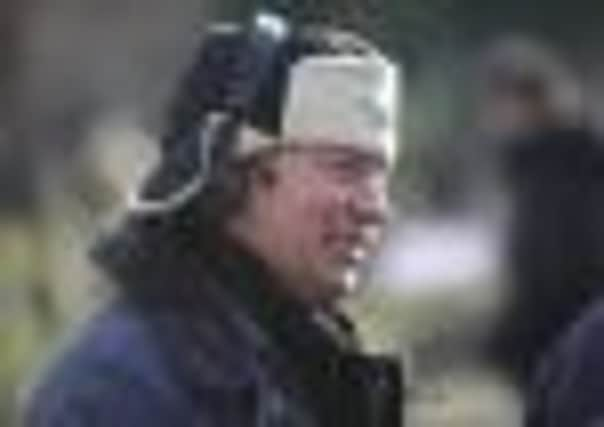Interview: Dexter Fletcher


It’s reminiscent of a scene in a Sergio Leone Western, only this time it’s Charlie Creed-Miles, not Clint Eastwood, and the director is a Londoner, not an Italian. Apart from that minor difference Wild Bill – even the title makes it sound like a horse opera – is entirely an English flick. And its director is one-time child actor Dexter Fletcher.
Scribblers like me, and those slightly younger, hold a special place in our hearts for Dexter Fletcher. For it was the easygoing Londoner who served as a hero figure to wannabe hacks as the lead in ITV’s Press Gang, a hit show in the 1990s that has now attained cult status.
Advertisement
Hide AdAdvertisement
Hide AdFletcher, now 46, was just 22 when he first played Spike Thomson in Press Gang. But he was far from a beginner; he began his film career 36 years ago with a minor role in Alan Parker’s Bugsy Malone, aged nine. There followed further work in The Elephant Man and The Long Good Friday – both instant British classics and nice titles to have on the résumé.
Fletcher has worked with them all. His co-stars have included Mel Gibson and Anthony Hopkins in The Bounty, Al Pacino in Revolution, Jonathan Pryce in The Rachel Papers and Robert De Niro in Stardust. Then there have been the cult movies – titles such as Lock, Stock and Two Smoking Barrels, Kick-Ass, plus classic modern TV like Band of Brothers, playing an American staff sergeant.
What’s more, a sufficient amount of filmmaking nous obviously rubbed off over the last 35 years to give him the confidence to tackle his first movie as director. Cue Wild Bill, a gritty saga of East End life with an ex-con seeking to turn his life around while his former gangland mates pile on the pressure for Bill, a man known for his hair-trigger temper, to re-join the fold.
Fletcher conceived the film as the tale of a man battling to bury his past and live up to his parental responsibilities, not as just another gangland thriller.
Advertisement
Hide AdAdvertisement
Hide Ad“There are lots of those films and I’ve been in numerous [examples] of them,” he says when we meet at a preview of the film in Leicester Square, London. “They’re great for what they are. I knew that people would be interested if I said ‘I’ve got a film set in the East End.’ That’s my jumping off point; people know me for that.
“I want everything to matter in this film. We were making a film about real people. That was paramount. It’s about relationships.”
Fletcher cast his friend Charlie Creed-Miles as the stayaway Bill. He also called in favours from acting pals. Thus Jason Flemyng and Jaime Winstone appear as social workers, Sean Pertwee is a cop and Marc Warren is a wastrel dad.
Another character – a metaphor for Bill’s journey to emotional and psychological maturity – is the Olympic stadium and village, an ongoing building site that reflected the change in Bill’s life and character.
Advertisement
Hide AdAdvertisement
Hide AdBut sink estates, kids selling crack cocaine, prostitutes, random thuggery and a high population of vicious low-lifes mean a film like Wild Bill has to build to a thrilling climax.
“I had a very strong idea about how I wanted it to look,” he recalls. “Charlie was quite adamant [saying] ‘Look, we’re talking about a guy who goes to a pub and fights eight guys. If he just goes and starts bashing everybody up immediately, we’ll lose all the things that we’ve earned throughout the rest of the film – his believability and honesty.’
“So we were both very concerned to make sure that Bill just wasn’t a superhero.”
Fletcher and Creed-Miles rehearsed for just one day with fellow cast and stuntmen. Anxious to avoid Schwarzenegger-esque cliché they incorporated a real-life incident in which Creed-Miles’s friend, caught up in a mass brawl, sank his teeth into an opponent’s leg.
Advertisement
Hide AdAdvertisement
Hide AdFletcher laughs at his spaghetti Western moment. “Yeah, the old man reading the paper, the bar room door closing, the music stopping, the close-ups... we started calling them ‘the spaghettis’ on set: ‘Give me a spaghetti’ which basically just meant a really big close-up, you know?
“The moment when the fight turns round which is when Charlie grabs the leg. I knew that I wanted to have some sort of humour and ridiculousness about it.
“As we were watching stuff come in we had this breadth but we also had these real close moments of intensity – being able to read where everyone’s at and really get in on the eyes. The joke is that that’s where the magic happens, but it is.”
Dexter Fletcher: A life on screen
Dexter Fletcher trained at the Anna Scher theatre school and made his film debut in 1976 as Baby Face in Bugsy Malone.
Advertisement
Hide AdAdvertisement
Hide AdHis stage debut came the following year in a production of A Midsummer Night’s Dream and a string of roles on the big and small screen followed.
While still best-known by some for playing Spike in Press Gang, he has appeared in more than 70 films and television series, from Layer Cake to Hotel Babylon.
He’ll next be seen on screen in St George’s Day about two infamous London gangsters.
Wild Bill (15) is on general release from today.